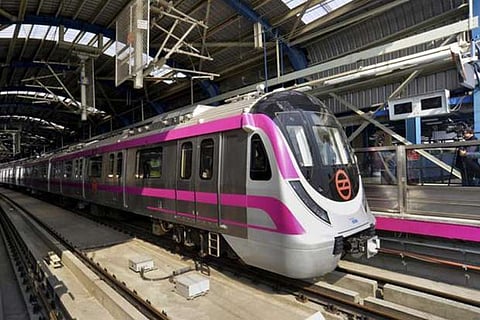

New Delhi
Mr Modi, who will be accompanied by Uttar Pradesh Chief Minister Yogi Adityanath, will flag off the Metro train from NOIDA on December 25 and with this, the Botanical Garden-Kalkaji Mandir Metro section of the new 'Magenta Line' will be opened subsequently for commercial operations.
The 12.64 kilometre long Botanical Garden - Kalkaji Mandir section of Phase 3 is going to significantly boost the connectivity between NOIDA and south Delhi localities such as Kalkaji Mandir and Nehru Place.
Initially, trains will be operated with a frequency of 5 minutes and 14 seconds on this section. A total of 10 trains will be pressed into service and two more trains (one each at Kalkaji Mandir and Botanical Garden) will be kept on standby.
This section will have Platform screen doors on all its nine stations.
The 12.64 kilometre long Kalkaji Mandir-Botanical Garden section of Phase three has nine stations: Botanical Garden, Okhla Bird Sanctuary, Kalindi Kunj, Jasola Vihar Shaheen Bagh, Jamia Milia Islamia, Okhla Vihar, Sukhdev Vihar, Okhla NSIC and Kalkaji Mandir. While Kalkaji Mandir is underground, all other stations are elevated.
This section will boost tourism in the area as many tourism landmarks such as the Lotus Temple, Kalkaji Mandir, Okhla Bird Sanctuary and Botanical Garden in NOIDA are located within walking distance from this corridor.
The section will also cater to two major educational institutions, Jamia Milia Islamia University and Amity University, NOIDA and a major super speciality hospital, Fortis Escorts Heart Institute.
Botanical Garden will be NCR's first ever interchange Metro Station on the metro network.
"The Botanical Garden Metro Station, on the Dwarka-NOIDA Blue Line has been transformed as the first ever interchange Metro Station in the National Capital Region (NCR) outside the boundaries of Delhi," the DMRC spokesperson said.
This station will provide interchange between Line 3 and the Botanical Garden corridor-Kalkaji Mandir Magenta line of Phase 3 (Line 8).This station will connect NOIDA directly with important locations of south Delhi such as Nehru Place, Kalkaji, etc.
Passengers travelling from NOIDA to Faridbad will now be able to change trains at Kalkaji Mandir and go directly to Faridabad.
Since both Botanical Garden and Kalkaji Mandir are interchange stations, there will be significant reduction in travelling time between various destinations especially those on the Blue and Violet Lines.
Once the entire corridor from Botanical Garden till Janakpuri West (38.23 kms) is opened, commuters from NOIDA will be able to go to Gurugram by changing trains a Hauz Khas. This will help immensely in decongesting Rajiv Chowk, which is currently the interchange point for travellers between NOIDA and Gurugram.
The 12.64 kilometre long Kalkaji Mandir-Botanical Garden section with nine stations, is a part of the 38.23 kilometre long Janakpuri West-Botanical Garden corridor, which will connect NOIDA with south Delhi as well as the domestic terminal of the Indira Gandhi International Airport. Commuters from NOIDA who would want to travel to Faridabad and Gurugram also will be able to avail benefits of this section and change trains at Kalkaji Mandir and Hauz Khas respectively.
This is also Delhi Metro's first ever corridor to be operated using the Communication Based Train Control (CBTC) signalling technology which facilitates movement of trains with a frequency of 90 to 100 seconds.
The new age Unattended Train Operation (UTO) enabled trains also will be operated for the first time on this section.
The DMRC spokesperson said the Metro trains on Magenta Line will initially operate with a driver with a high level of automation including platform screen doors. This high level of automation is there to avoid such human errors.
The main line will use Communication Based Train Control (CBTC) which will ensure full safety and faster frequency of operations, the spokesperson added.
Visit news.dtnext.in to explore our interactive epaper!
Download the DT Next app for more exciting features!
Click here for iOS
Click here for Android